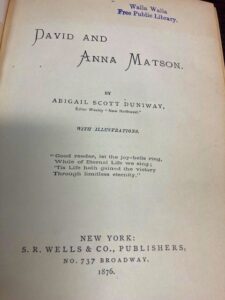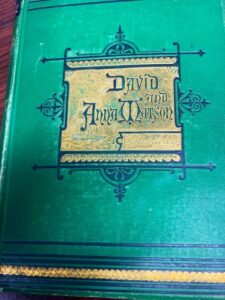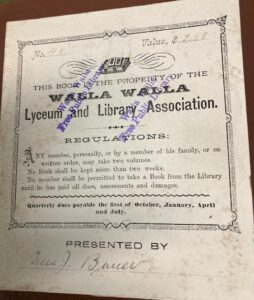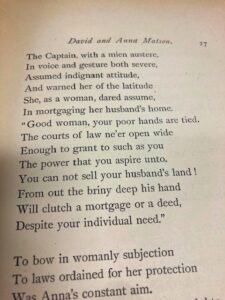This spring I’m doing research for a new Living History presentation as suffragist leader Abigail Scott Duniway. In 1852 she came West with her family. At age seventeen she was the second eldest of nine siblings. Her father tasked her with recording the trip in a journal. Abigail became keenly aware of the tragedy many women faced because they had no rights, including her own mother who emigrated to Oregon against her will and died on the trail. As an adult, Abigail began a decades-long fight for equal suffrage. She founded a newspaper, The New Northwest, in 1871, and authored several novels that were serialized in that publication. She also wrote a handful of books that were published by others. Reading one of these at the local library proved how character-building building a character can be!
Are you talking in circles again?
Not intentionally, 9, I’m just playing with words. Abigail’s love of writing is something she and I have in common. I’ve read her autobiography, Path Breaking, and several other histories about her life and the suffrage movement in the Pacific Northwest. Her novels are mentioned in those sources. For months I’ve been meaning to read her novel, David and Anna Matson, available in the Walla Walla Library reference room but not for checkout.
Why can’t you check it out?
Because it’s old and fragile and rare, Lily. Look at the date on the title page:
The year of the United States Centennial.
The front cover is very loosely attached to the spine. Otherwise the book is in pretty good shape. Two pages have an imagination-provoking stain splashed across them (my top guesses are evidence of a murder, or, more likely, spilled cocoa). Pretty standard condition for a piece of popular fiction of this vintage.
There’s a page that recognizes the donor. It surely has a history of its own:
I get a chill of excitement when I work with archival materials, like I’m getting away with something. It’s a thrill to handle a text that’s nearly 150 years old, to feel the presence of other readers as I turn the pages.
Once I got past the title page and some pages of pretty awful poetry in the introduction to David and Anna Matson I got a chill of a different kind:
The book is written in verse!
You mean like a song?
More like Shakespeare.
To me it’s more like doggerel:
Oh. Not like Shakespeare.
Weird. But why were you alarmed?
Because it was the last thing I expected. In Abigail’s autobiography I was acquainted with her florid writing style. Pretty much what you’d expect of someone who spent most of their life in the Victorian Era. I’d even read some of her overwrought poetry that she’d trot out for patriotic occasions. But I never considered she’d write a novel in verse!
There’s a line in the middle of it that isn’t part of a couplet.
To me, “austere” and “severe” at the top of the page dance on the edge of being a slant rhyme (words that have similar but not identical sounds). My poet friends make jokes about slant rhymes, like the pairing of “broccoli” and “snowshoe.”
I don’t get it. Those don’t rhyme at all.
Exactly!
I confess I have an aversion to verse, especially novels written in verse. Maybe this form is intended to be read out loud, in one’s pioneer cabin, by candlelight? That certainly would have fit the time when it was written. The theme is one championed by Abigail Scott Duniway: an illustration of how women had no rights at that time in our history. Wives and children were legally the property of the husband.
Like slavery? I’m glad it’s not like that now!
Not for the moment, Lily, but would it surprise you to learn that some people in our federal government are trying to enact policies that turn back the clock on this?
Who would dare?
What so many people forget in this country is that rights, once gained, need to be maintained.
Hey, that rhymes!
Kind of. Now find your walking shoes, 9! You and Lily and I are going to march in a nationwide demonstration tomorrow to let those people who are trying to destroy the rights- -of women and men both- -know that we see what they’re doing, and that we’re not going to let them get away with it.
A fine opportunity for building character.

Subscribe To Susan's Newsletter
Join the official mailing list to receive the latest news and updates from Susan D. Matley. It's free and you can opt out anytime!





What an interesting bit of history! I find it of interest that her dad tasked her with recording the trip.
I will be marching in spirit tomorrow!
And because she kept the journal, there’s information about the crossing in her voice. That, and her autobiography, provide excellent clues to how she would have presented herself to an audience- -so helpful in portrayal!
Thanks for marching in spirit. Reading suffragist history really brings home how important it is to continually protect our rights!
Re your comment on my comment on your blog piece: I am not quite awake yet and I first read the words “project our rights!” instead of “protect our rights!”
I am thinking we must “protect and project!”
Yes, projecting is an important part of it- -to confirm and affirm our rights, and to use them the help those who do not have the same rights as we do!